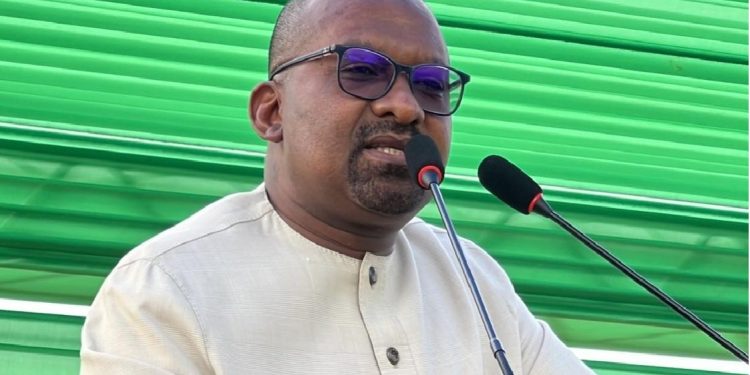By: Aaron Bundu Lahai-Head of Media & Public Relations
Sierra Leone’s Vice President Dr. Mohamed Juldeh Jalloh, Monday 16th June, officially launched the Sierra Leone Country Economic Memorandum (CEM), and the Country Climate and Development report (CCDR) at the Radisson Blu Hotel, Aberdeen in Freetown.
The Honourable Vice President revealed that Government requires about $2.76 billion to be able to meet Sierra Leone climate adaptation needs in the next couple of years. He highlighted that Government could only leverage the resources through building strategic partnership by using the Sierra Leone Climate Fund as a vehicle to secure the 2.76 billion hat Government needs to meet the country’s climate adaptation goals.
Vice President Jalloh is his address describes the two reports as documents that look at Sierra Leone sustainable growth trajectory in view of climate change and national development, adding that the reports demonstrate the commitment and the collaborative effort of the World Bank, the Government of Sierra Leone, and development partners. “Sierra Leone, like so many sub-Saharan African countries over the years, continues to make immense challenges, including severe external shocks to its economy, but continue to demonstrate remarkable resilience” he stated.
Vice President Jalloh referred to the COVID 19 pandemic, as one of those shocks, and the Russian and Ukrainian crisis that had a devastating consequence for the economies in the country. He stated that the CCD report provides a refreshing stock taking analysis of the progress Government continue to make, while at the same time drawing Government’s attention to the complex challenge such as the looming threat of climate change.
Vice President Jalloh cited the CCD report by saying that the economic ramifications of climate change, if not addressed adequately, the country’s GDP could be reduced up to10% by 2050. He also quoted the report by pointing out that the sectors most vulnerable to climate change are agriculture, health and infrastructure. “You will agree with me that these are the sectors that are really central to our economy and our national development,” he buttressed.
Vice President Jalloh narrated that the Sierra Leone Country Economic Memorandum provides a road map to harness the potential of the country’s natural resources, improve human capital, build an enabling environment to attract foreign direct investment, and develop private sector.
The Honourable Vice President stated that the report identified four key priorities to unlock the potential of the country’s economy including restructuring and maintaining micro economic stability through high growth and fiscal discipline; recalibrating the role of the state to play a pivotal role in driving private sector development; promoting private sector development by providing key infrastructure, like electricity, land acquisition; and building human capital by investing in education, particularly technical vocational education.
Vice President Jalloh explained that the second report, which is a Country Climate Development Report, outline three key pathways to building climate resilience. The three key pathways according to Vice President Jalloh include developing green energy and sustainable cities by finding off grid solutions; promoting climate smart agriculture and natural resource productivity; and strengthening social resilience.
He categorically said that the report is a call for action, and therefore called for a more effective and transformative collaboration between government, partners, private sector businesses and civil society organizations.
The Honourable Vice President reminded the participants that the Country Economic Memorandum report clearly state that growth potential is promising with improve governance, and the threat of climate change. He noted that Government would look at the report closely, discussed the report in detail and then built critical action points.
“So, I think another key priority is governance, improve governance, and added to that is public sector capability. We have to focus on how development is delivered. Our programs impact growth. That is essentially the dynamics of public sector delivery,” he deliberated.
He concluded by emphasizing on private sector support, he noted that Government don’t create jobs but creates the enabling environment for private sector institutions to create jobs. He believed that institutions that support the state to provide enabling environment like the National Investment Board should be positioned to support private sector to be able to capture finances coming from outside because of the too much bureaucracies. He officially launched the Sierra Leone Country Economic Memorandum, and the Sierra Leone Country, Climate and Development Report.










